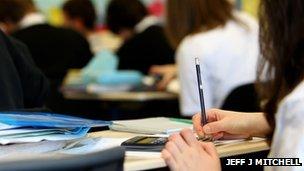Private tutors boost grammar chances, suggests survey
- Published

Some 72% of first year grammar school pupils said they were tutored for entrance tests
Many parents rely on private tutors to boost their child's chance of a grammar school place, suggests a small poll.
Seventy-two per cent of 212 first year grammar school pupils said they had been tutored for entrance exams in their last years of primary school.
Researchers from the Institute of Education (IoE) spoke to students at grammar schools in south-east England.
The results suggest pupils may not have an equal chance of getting into grammar school, said author Prof Judy Ireson.
"Parents may see private tutoring as a rational way to help their children perform well in the entrance exams for schools of their choice," she said.
"Yet if our findings reflect a national picture it means that grammar school selection is not a level playing field with some children having a substantial amount of coaching to succeed."
Small sample
The study asked pupils at two state grammar schools about their preparation for the entrance tests.
The researchers found that private tutors had helped prepare children for entrance exams including verbal and non-verbal reasoning tests as well as with English and maths.
The research suggested that 67% of the grammar school pupils polled had received one-to-one coaching with 5% tutored as part of a small group.
Of those who had been tutored, eight out of 10 (78%) believed that tuition helped them to pass the entrance exam.
Only 6% continued to be tutored during their first year in grammar school.
"One of the key factors is that tuition gives these pupils confidence and helps calm down pre-exam nerves," said Prof Ireson, Emerita Professor of Psychology in Education at the Institute of Education, University of London.
Barry Sindall, chief executive of the Grammar School Heads Association (GHSA) said the organisation was concerned about the issue and was working to ensure "a level playing field in terms of tests".
Tutor proofing
"There has been no definitive research on the difference that coaching can make and the numbers using coaching varies across the country.
"The issue for GSHA is not how do you stop coaching but rather how do you stop coaching making an impact."
Mr Sindall added that many schools were running familiarisation programmes, some aimed at disadvantaged children, while increasing numbers were using tests "claimed to be resistant to the distorting impact of coaching" such as those developed by Durham University's Centre for Evaluation and Monitoring.
Prof Ireson said the IoE team was hoping to recruit a larger sample of England's 164 grammar schools for a wider study to give a fuller national picture of the extent and impact of entrance test tutoring.
- Published26 January 2013
- Published30 July 2012
- Published29 March 2012